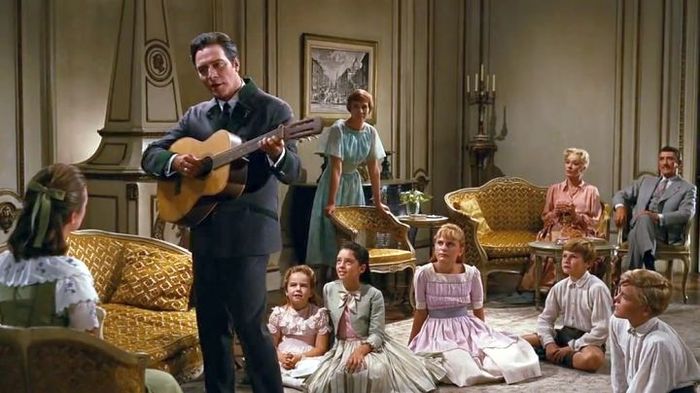Why TV Theme Tunes Should Return in the Age of Streaming
Imogen Scott explores the advantages of theme tunes and why they are due a welcome return
Theme tunes were once TV shows’ biggest campaigners. Familiar, catchy, and often flagrantly loud, they would parade over surrounding commercials and, like the school bell ringing at the start of lunch, announce to everyone remotely within earshot that the fun was about to start.
The best themes could do this in seconds. Play me the first three notes of The Simpsons theme and I can already see the clouds parting, the title coming into view, and the chaos of Springfield that ensues. Then before I know it, the main Simpsons motif is playing over and over in my head, and I’m reminiscing the good old days of sitting in front of the TV with my brothers on a Friday night, ready to catch up on Bart and Lisa’s latest adventures.
“Even without lyrics, a simple and pleasant tune can go a long way.”
I only need to read “yes, no, maybe” to start belting the Malcolm in the Middle theme, and can probably recite the lyrics to South Park or Phineas and Ferb more easily than my own country’s national anthem. Even without lyrics, a simple and pleasant tune can go a long way, whether it’s the funky bass in Seinfeld, the cheery brass melody of Wallace and Gromit, or the sweeping strings in It’s Always Sunny in Philadelphia.
However, the golden age of light-hearted weekly sitcoms and fun, catchy themes is a thing of the past. As popular TV veered towards the ‘critically acclaimed’ and ‘cutting edge’, starting in the late 90s with shows like The Sopranos, simple and repetitive themes were tossed aside as a cheap, cheesy and unsophisticated way to start a show.
There is also the rise of streaming services, where we no longer ‘catch up’ on our favourite TV shows each week, but instead binge them in one go. When inhaled all at once, earwormy theme tunes become tiringly repetitive extremely quickly and more directors are using ‘soundscapes’ above leitmotifs to enhance the atmosphere of individual scenes.
The result, however, is often rather unfulfilling. Take Bridgerton, for example. Abandoning an opening theme altogether, the show uses classical versions of contemporary pop songs which happen to reflect the characters’ emotions, maintaining a stately setting while connecting to a modern audience. Bridgeton’s classical music and pop variations are certainly fun in the moment, but their lasting effect is one of a pleasant, but meshy and nondescript vibe rather than a solid, tangible memory to associate the programme with.
Even where theme songs are being used, they feel more like obligatory opening-credits landfill than any source of entertainment or character. Never mind the vague and suspenseful violins and guitar of any Netflix true crime documentary or detective show – even teen dramas and sitcoms are severely lacking in any concrete musical personality. The sci-fi genre, which once dished out such iconic themes as The Twilight Zone and Doctor Who, is also starting to falter. Dark, although a fantastic show in itself, uses a licensed track from Apparat, which falls under the typical Netflix moody electronic-acoustic sludge.
The exception that proves the rule may be Stranger Things, whose opening theme is almost impossible to skip. Its deep synth arpeggios and heart beat-like pulses perfectly personify the show’s sense of mystery and foreboding, while also giving it a unique and instantly-recognisable sound. However, the theme isn’t exactly something you’d hum while walking across the street. Despite having finished the show only recently, I still find that programmes with catchy themes that I watched over ten years ago take a much more vivid space in my memory.
“The song has become such a key part of the show’s identity that endless repetitions don’t diminish its value.”
Even in the era where old shows can also be binge-watched, simple catchy tunes can be more of a benefit than a detriment. Just recently I’ve been watching Curb Your Enthusiasm; as exhausting the theme tune is as it is when consumed non-stop for hours on end, it will nevertheless remain with me forever, and so will the show in all its glory. The song has become such a key part of the show’s identity that endless repetitions don’t diminish its value. The fact that the theme has become a popular meme can’t hurt the show’s success either.
I’d argue, therefore, that a return to catchy theme tunes would actually benefit the shows themselves. Memorability and long-term success go hand in hand; when shows bundle up all their chaos and complexity into one neat tune – a tune that upon hearing, will unravel and allow all the smaller details to flow black into our minds – they become more memorable.
Yet maybe this is just a case of childhood nostalgia. Times are changing, TV is evolving, and catchy theme tunes aren’t the best fit for every show out these days. Then again, the shows which seem to stick in our heads are the ones which we can recall with a single melody. So why not bring back the lost art of catchy themes and make our TV memories last?
 News / Pembroke to convert listed office building into accom9 December 2025
News / Pembroke to convert listed office building into accom9 December 2025 News / Gov declares £31m bus investment for Cambridge8 December 2025
News / Gov declares £31m bus investment for Cambridge8 December 2025 Features / Searching for community in queer Cambridge10 December 2025
Features / Searching for community in queer Cambridge10 December 2025 News / Uni redundancy consultation ‘falls short of legal duties’, unions say6 December 2025
News / Uni redundancy consultation ‘falls short of legal duties’, unions say6 December 2025 Lifestyle / Into the groove, out of the club9 December 2025
Lifestyle / Into the groove, out of the club9 December 2025









